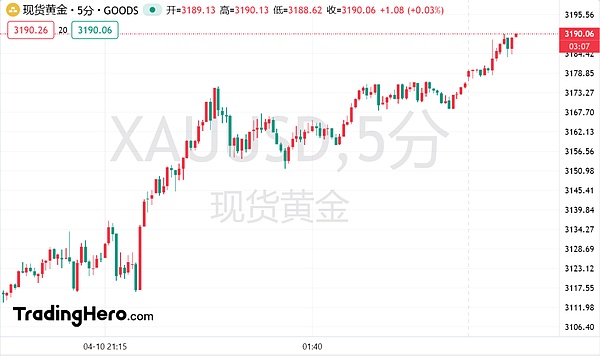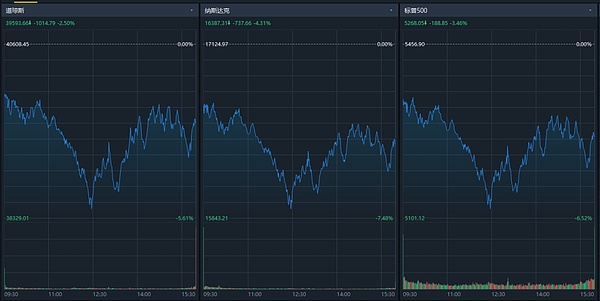When I woke up, the global market had changed. The following are the facts that happened in the night trading last night:
Affected by Trump's inconsistency, the US dollar index fell more than 2% during the session, setting the largest single-day drop since 2022;
The safe-haven asset gold broke through the historical high, soaring more than 3%. The safe-haven Swiss franc recorded its biggest gain in a decade;
The sell-off of U.S. debt continued, and global investors cast a vote of no confidence in the United States with their feet;
The S&P 500 index plunged 6.3% at one point, the biggest drop in more than five years;
Yellen angrily denounced Trump: "The worst economic self-destruction I have ever seen in my life!"
Affected by Trump's inconsistency, the U.S. dollar index fell more than 2% during the session, recording its biggest one-day drop since 2022;
Safe-haven asset gold broke through a record high, soaring more than 3%. The safe-haven currency Swiss franc recorded its largest increase in ten years;
Spot gold opened at a record high on Friday, breaking through $3,180/ounce and $3,190/ounce in succession; New York gold futures broke through the $3,200 mark again after a week.

Even after the slowdown in US inflation data, gold rose to a record high as concerns about the impact of tariffs on the global economy continued to drive investors to seek safety in precious metals.
The sell-off of U.S. bonds continued, and global investors cast a vote of no confidence in the United States with their feet;
The sell-off of U.S. bonds continued, and the yield on the U.S. 30-year Treasury bond rose 12 basis points in one day to 4.85%.
As reciprocal tariffs took effect today, U.S. bonds plummeted, with the 10-year U.S. Treasury bond yield reaching its highest level since February this year, and the dollar also weakened. Although some observers point out that currencies such as German government bonds and the yen may become new safe havens, they also face risks in terms of liquidity, their own economic and monetary policy prospects, etc. "If you want to protect your capital and get a certain level of return, there aren't many assets you can choose from," said Pilar Gomez-Bravo, co-chief investment officer of global fixed income at MFS Investment Management. The sell-off in U.S. Treasuries is the most obvious example of investors losing confidence in common safe-haven assets.
The S&P 500 index plunged 6.3% at one point, the biggest drop in more than five years.
The epic rally in U.S. stocks was short-lived, with the three major stock indexes closing lower on Thursday. The S&P 500 closed down 3.5%, falling 6.3% during the session, the biggest intraday drop since March 2020; the Nasdaq fell 4.31%, and the Dow fell 2.5%. Large technology stocks fell collectively, with Tesla falling more than 7%, Meta falling more than 6%, Nvidia and Amazon falling more than 5%, Apple falling more than 4%, Google falling more than 3%, and Microsoft falling more than 2%. Chip stocks fell, with Micron Technology falling more than 10%, Intel falling more than 7%, and TSMC falling more than 4%.

Yellen angrily denounced Trump: "The worst economic self-destruction I have ever seen in my life!"
Former U.S. Treasury Secretary Yellen said on the 10th that the economic policies of the new U.S. government were the "worst self-harm" she had ever seen. Against the backdrop of policies such as imposing tariffs, the risk of the US economy falling into recession has increased. In an interview with CNN on the 10th, she said that the current US government's tariff policy may increase the annual expenditure of the average American family by nearly $4,000. In addition to the negative impact that tariffs may have on consumer spending, the US economy is also facing a huge impact of uncertainty.
Yellen said, "In the face of such great uncertainty, which company will make long-term investments?" The reduction in investment spending and consumer spending is likely to trigger an economic recession. Yellen emphasized that in addition to the tariff policy, the current government's cuts to public service agencies such as the Social Security Administration and the Internal Revenue Service, as well as the compression of government programs such as Medicaid and food relief, may harm the interests of low-income families. This series of policies is extremely "destructive."
 Anais
Anais





